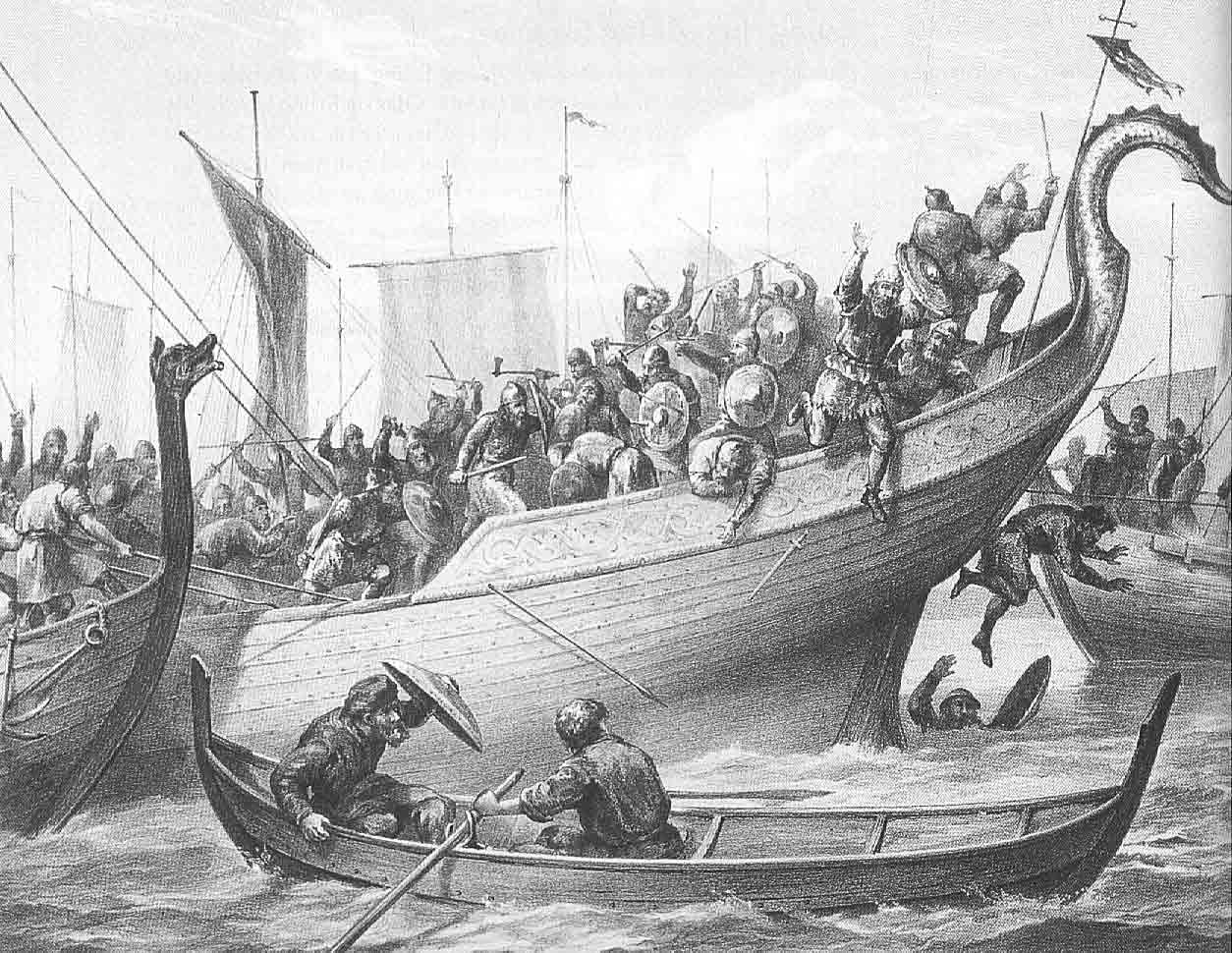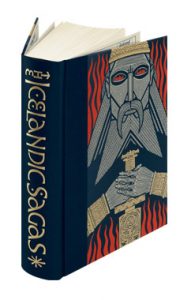Abbie Farwell Brown described the far north in his 1902 book, “In The Days of Giants,” as “the land of the midnight sun, where summer is green and pleasant, but winter is a terrible time of cold and gloom; where rocky mountains tower like huge giants, over whose heads the thunder rolls and crashes, and under whose feet are mines of precious metals.”
It’s a land that holds legends of Fafnir the dragon and his cursed ring, of myths of Odin and his heaven of warriors, and of tales of brave men who charged headlong into many adventures documented in their famed sagas.
Among these great sagas are many from Iceland, and I recently had the pleasure of reading a 1999 collection of these stories from The Folio Society, rightly called The Icelandic Sagas. This version collects 12 of these sagas, from versions printed in English in the 1960s and 1970s, including the “Greenland Saga” and “Erik’s Saga” which tell of viking discovery of the Americas.
What may be lesser known about the cultures of the far north is that many of its warriors were known for their poetry. Odin, after all, was considered the patron God of poetry; and some of their most famous poems were written by the heroes of these sagas.
Egil Skallagrimsson of Borg, the hero of “Egil’s Saga,” for example, is described herein as “the greatest warrior-poet of the Viking Age.” Unfortunately, for anyone who doesn’t speak the Icelandic tongue, the full enjoyment of this poetry is sealed off from us; but the editors have done their best to present it here. They note with Egil’s works, in particular, “The poetry contained in ‘Egil’s Saga,’ with its intricate metaphors and elaborate verse-form, has caused immense problems to all his translators. In literal translation it is virtually incomprehensible.” Thus, this version uses the 1976 translation of “Egil’s Saga” from Hermann Palsson and the late Paul Edwards, which are readable and still retain meaning.
One of Egil’s most famous poems is found here (and considered by some to be the greatest of Viking literature). He loses two of his three sons in the same autumn of 961, briefly turns to rage against Odin, the god he followed, but through the writing of the poem is able to make sense of his grief, overcomes it, and ends the poem with gratitude for this gift of poetry.
The poem is a wonderful reflection on the value and lore of poetry itself. Here are a few excerpts:
“My sorrow the source
Of the sluggard stream
Mind-meandering
This heavy word-mead
Poet’s power
Gold-praised, that
Odin from ogres tore
In ancient time.
“Purest of possessions,
Poetic craft, power
That dwarf-devised
Drew first breath:
Now feel it surge, swell
Like a sea, old giant’s blood
About the cragged cliff face
Of the dwarf-caves.
And he continues later into the poem, lamenting at the loss of his son, but stating the ability to find comfort in Odin’s gift of poetry has repaid the debt:
“I shall make offerings to Odin,
Though not in eagerness,
I shall make my soul’s sacrifice,
Not suffer silently:
Although this friend has failed me,
Fellow of Gods,
To his credit he comforts me
With compensation.”
Egil is far from alone in his talent, and poetry can be found in many of these sagas, often telling of war and adventure, and reflections on life and death.
Here’s one from Gunnlaug’s Saga:
“The halls of great men call me,
The guest of august monarchs;
Three kings of rich dominions,
Two earls—I promised early.
For me there is no turning
Until my leader needs me,
The kingly man of battle
Who showers us with his riches.”
Some poems also have a more gruesome air about them, but often retain some deeper meaning. Take for example a segment of this one from “Njal’s Saga,” sung by a group of strange women found weaving their looms with the fallen bodies of men, and the tools of war:
“Let us now wind
The web of war,
Where the banners of battle
Are forging forward.
Let his life
Not be taken:
Only the Valkyries
Can choose the slain.
“Lands will be ruled
By new peoples
Who once inhabited
Outlying headlands.
We pronounce a great king
Destined to die;
Now an earl
Is felled by spears.
…
“We sang well
Victory songs
For the young king;
Hail to our singing!
Let him who listens
To our Valkyrie song
Learn it well
And tell it to others.
“Let us ride our horses
Hard on bare backs,
With swords unsheathed,
Away from here.”
Of course, while poetry can be found interspersing many tales in The Icelandic Sagas, I should be clear it does not heavily include poetry. It’s mainly stories narrating various tales of adventures, wars, and various encounters both worldly and otherworldly. Some stories are very mundane, while others carry a more supernatural nature to them. All, however, share the same sense of wonder and adventure that I believe is the real magnet that has drawn many to these classic tales.

Despite the popularity around the tales of vikings, the Norse mythology, and the sagas in general; there are surprisingly few publishers reprinting large collections of them.
The only complete English print of the stories (49 that I’m aware of) is The Complete Sagas of Icelanders from Leifur Eiriksson Publishing, but it will run you $299. The other two large collections are The Sagas of the Icelanders from Penguin Classics Deluxe Edition available at a very reasonable $11, and includes 17 stories; and the The Icelandic Sagas from The Folio Society, which is done with a very high-quality print and runs at $87, and which I have written about here.
The Icelandic Sagas includes three of the five major Sagas of Icelanders (Egil’s Saga, Njal’s Saga, and Eyrgyggja Saga). It does not including Laxdela Saga or Grettir’s Saga, likely due to their length (close to 280 pages and 320 pages, respectively), and the already large size of this book (832 pages). For anyone interested in these stories or viking lore, I would personally recommend this edition.
















